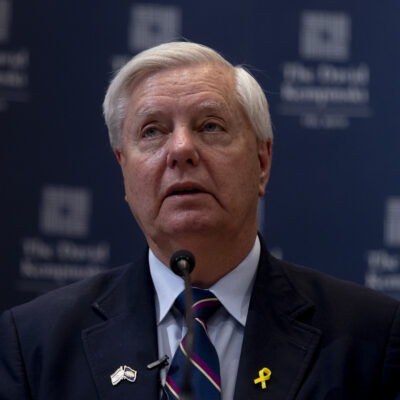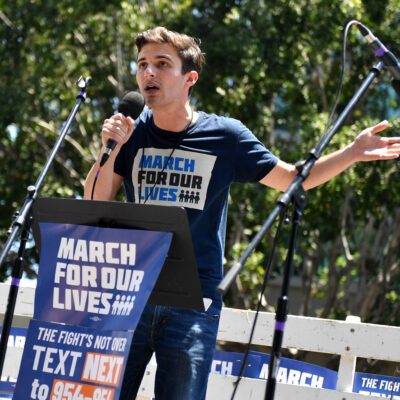
AP Photo/Matias Delacroix
Israeli presence in Syria ‘a direct lesson of Oct. 7’
Despite indirect Israel-Syria talks and al-Sharaa’s greater acceptance in the world, the IDF is likely to maintain a presence in Syria for years to ensure radical militias don't gather on its borders, experts say
Syrian President Ahmed al-Sharaa made a surprising admission during a visit to Paris on Wednesday: that Damascus and Jerusalem have been engaged in indirect negotiations in recent days.
“There are indirect talks through mediators to calm down the situation so that it doesn’t get out of control,” al-Sharaa said. Reuters had reported earlier that the United Arab Emirates was mediating between the countries, a claim Abu Dhabi denied.
Al-Sharaa, the former leader of an Al-Qaida offshoot in Syria whose nom de guerre was Mohammed Al-Jolani, was welcomed by friendly crowds at the Eiffel Tower on Wednesday evening, a potent symbol of his growing acceptance in the international community.
French President Emmanuel Macron said that he is looking to have the EU lift sanctions on Syria and would advocate for the Trump administration to do the same.
Israel, however, continues to be deeply suspicious of al-Sharaa, whom Israeli Foreign Minister Gideon Sa’ar has described as “a jihadist in a suit.” The IDF maintains a presence over the border that extends miles into Syria, which Israeli Defense Minister Israel Katz has said will continue “indefinitely.”
Macron had a warning for Israel after his meeting with al-Sharaa: “You can’t ensure your country’s security by violating the territorial integrity of its neighbors.”
Last week, Israel struck an area on the outskirts of Damascus, to protect the Druze community, whose militias had been clashing with Syrian government-affiliated forces.
“Israel is in Syria as a direct lesson from Oct. 7 [2023],” Sarit Zehavi, the founder and president of the Alma Research and Education Center, which specializes in Israel’s northern border, told Jewish Insider this week. “On Oct. 7, Israel understood that we can no longer let radical elements build military capabilities on the other side of our border … If we’re not there, we’ll have radical Sunni bases on our border.”
“We can’t let the monster grow. We have to cut it down while it’s small. That’s the basic idea,” she added.
Al-Sharaa, Zehavi said, “is a radical factor, the former head of Al-Qaida in Syria, who cannot be trusted not to attack Israel.”
Israel’s major interest in Syria, according to former Israeli cabinet minister and IDF Brig.-Gen. (res.) Effi Eitam, “is the military and physical security of the residents of the north and the State of Israel, by providing defensive depth for towns near the northern border.”
“Israel will have to stay in a strip at a depth of [three to six miles] in which it will have to remain for a long time and not let any hostile organizations into that perimeter,” Eitam said. “It will have to go from the peak of Mount Hermon and along the line of the Golan.”
That area was once a buffer zone, created after the 1973 Yom Kippur War and meant to be enforced by the U.N., which Zehavi said “has not really been demilitarized since 2013, but Israel did not defend itself” against the influx of arms to the area.
Israel has set up nine permanent military positions in the former buffer zone, and soldiers use them as bases from which to depart for military actions in what Eitam called an “area of influence,” extending to Jabal al-Druze, or Druze Mountain, about 18.5 miles into Syria from Israel, where much of the ethnic minority in Syria lives.

The Israeli Air Force supports the ground troops with airstrikes, which are also used to stop arms smuggling to Hezbollah in Lebanon via Syria, an aim that al-Sharaa also supports, according to Zehavi.
Shira Efron, research director for the Israel Policy Forum, said that Israel must consider options other than using force.
Efron co-authored a recent article in Foreign Affairs that sparked controversy in Israel over its suggestion that Israel is engaged in “dangerous overreach in Syria” and “may well create a new enemy when there is currently none.”
Efron and co-author Danny Citrinowicz, of Tel Aviv University’s Institute for National Security Studies, acknowledged Israel’s “genuine national security concerns.” The two wrote that “the new Syrian government needs to be judged by its actions and not only its words. But it presents Israel with a potentially golden opportunity to deepen Iran’s isolation, turn Syria from a foe into a peaceful neighbor, and stabilize its region.”
They also warned that “ramp[ing] up incursions into Syria” would increase tensions with Turkey, al-Sharaa’s primary backer.
“An armed conflict with Turkey is not in [Israel’s] interest,” Efron told JI.
Zehavi pushed back against Efron and Citrinowicz’s cautious approach.
“Syrians of all stripes don’t need Israel to eat each other alive; they’ve been at it for 15 years,” she said. “Jolani’s people are total jihadis … The leopard won’t change his spots. Just because he’s wearing a tie and meeting with Macron doesn’t mean he abandoned his ideology.”
Rather, Zehavi said, “I am seeing an opposite process. [Turkish President Recep Tayyip] Erdogan, whose country is a member of NATO is allowing him to speak out against Israel with the extreme language of the Muslim Brotherhood, and Erdogan is Jolani’s patron.”
“After what happened to Israel [on Oct. 7], we can’t rely on analyzing our enemy’s personality and thinking that we understand them. We have to neutralize their capabilities,” she added.
Eitam said that it will take about five years before Syria will stabilize and Israel can form a more conclusive perspective on al-Sharaa .
“We cannot agree to a situation in which he takes over all of Syria’s territory,” Eitam said. “There is a greater chance that the regime has an extremist Sunni character. In the map of enemies and friends, they are more likely to be enemies.”
The Trump administration has largely given Israel freedom to act in Syria, but Eitam warned that may not last.
“The Americans want to solve problems. We have to be careful because there is an American desire to make agreements, but if that means that we would have to allow ISIS to take over Syria, it’s better not to have one.”
That being said, Eitam said the U.S. plays a positive role in that it “holds Turkey back” and that Israel can reach a liveable diplomatic arrangement with Syria if it is very cautious.
While Israel has launched multiple strikes to protect the Druze population in Syria, Israel’s priority is security, especially for residents of the Golan Heights and Galilee.
Working with and protecting Druze in Syria, then, complements that goal.
“If our desire is not to allow jihadis to grow stronger, [Syrian Druze] are a kind of counterweight,” Zehavi said. “They have militias that will not give up their weapons – no militia in Syria has disarmed.”
In addition, the Druze population in Israel has demanded that it protect their brethren in Syria, including with a demonstration blocking a major highway last week.
Zehavi said “there are debates in Israel about how to act [in defense of Syrian Druze], but no one in Israel wants to see them massacred.”
Eitam argued that the area between the buffer zone and Jabal al-Druze should be “controlled and secured by a Druze army that Israel will train and arm so that we can ensure the security of their community to which we have ties mostly because of their major presence in the Golan and within Israel.”
“Creating an armed Druze fighting entity as a proxy of Israel will prevent ISIS with Turkish aid from taking over the area,” he added. “We don’t need the IDF present and controlling the area; we need a Druze force with intelligence and arms.”
Zehavi, however, said the idea of using the Druze in Syria as a proxy force is “going too far.”
“Israeli attempts to be someone’s patron and influence politics in other countries have failed because we don’t have enough of an understanding of the politics in other countries. It’s not just a matter of identity. There are contradicting interests,” she argued.
Efron noted to JI that “the Druze themselves are divided internally [about help from Israel], with some calling for Israel’s help and others saying Israel disrupts Syrian unity.”






